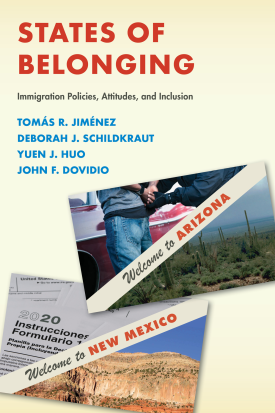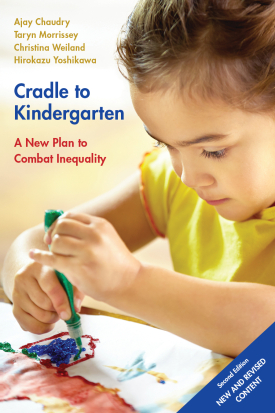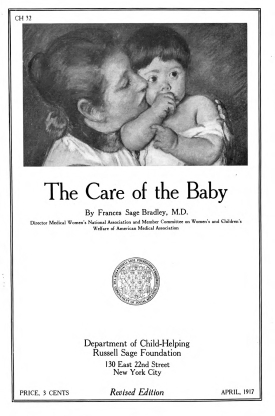Differences in academic achievement between high and low socioeconomic status (SES) children arise at an early age. Understanding the origins of these disparities is essential for designing effective policy responses. Most studies have focused either on parents’ inability to afford inputs (e.g., nutrition or preschool) or knowledge gaps among low-income parents.
From 1983 to 2016, the median White family wealth increased from about 8 to 13 times of that of the median Black family, and the pandemic had more negative effects on the economic status and mortality of Black families. Yet few studies investigate how inequality impacts individuals’ psychological processing and, in turn, might increase racial prejudice among whites or how it affects racial prejudice or racial coalition building among minorities.
About This Book
This paper, a revised 1917 edition of a 1913 report published by the Department of Child-Helping of the Russell Sage Foundation, offers concise advice on early child-rearing to expectant mothers.
Frances Sage Bradley was chairman for Georgia of the Committee for Public Health Education Among Women of the American Medical Association and state chairman, Publich Health Committee, Georgia Federation of Women's Clubs.
Download
RSF Journal
View Book Series
Sign Up For Our Mailing List
Apply For Funding

States of Belonging
About This Book
Winner of the 2022 Otis Dudley Duncan Award for Outstanding Scholarship in Social Demography from the Population Section of the American Sociological Association
2022 Honorable Mention for the Latino Politics Best Book Prize from the Latino Caucus of the American Political Science Association
“Bringing together the wisdom of sociology, political science, and psychology, States of Belonging finds that state level policies towards immigrants can affect a sense of belonging not only for immigrants but for native-born citizens as well. Utilizing state of the art mixed empirical methods including surveys, experiments, and in-depth interviews, this brilliant study shows that state level policies can have far reaching consequences. The surprising lessons these authors draw from Arizona and New Mexico are important ones for all Americans.”
—Mary C. Waters, PVK Professor of Arts and Sciences and the John L. Loeb Professor of Sociology, Harvard University
“States of Belonging is a stellar example of collaborative social science research, bringing together experts from sociology, political science, and social psychology to address a critical policy question: How do a state’s immigration policies affect the lived experience of its residents, both immigrant and U.S.-born? Focusing on Arizona and New Mexico as two contrasting immigration climates, the authors smoothly and skillfully weave together historical context, contemporary policies, experimental data, and subjective reports to show how specific state policies, immigration attitudes, and a personal sense of belonging to state and nation are closely intertwined. Their conclusion that a desire for shared citizenship outweighs presumed differences based on political party or ethnic group is an important message for us to hear, and their case for immigration reform is persuasive and timely.”
—Kay Deaux, Distinguished Professor Emerita, Graduate Center, City University of New York
“If you’ve ever desired a book about immigrant incorporation that is psychologically nuanced, sociologically informed, and politically relevant, States of Belonging is the book for you. Gracefully written by a quartet of leading social scientists, this book provides us with new and revealing insights about the sense of belonging experienced by immigrants and their descendants—and the essential role that individual states play in this process through their own responses to immigration. What is more, they show readers that non-Hispanic whites are also significantly impacted by the degree to which immigrants and their families are welcomed or not by their own state, thus demonstrating a more complicated and often overlooked dynamic in white-Latino relations. Methodologically meticulous and displaying an impressive theoretical range, this volume is likely to change many minds about the extent to which the incorporation of immigrants has implications for us all. It certainly changed mine.”
—Efrén Pérez, Professor of Political Science and Psychology, UCLA
Political turmoil surrounding immigration at the federal level and the inability of Congress to pass comprehensive immigration reform have provided an opening for state and local governments to become more active in setting their own immigration-related policies. States largely dictate the resources, institutions, and opportunities immigrants can access: who can get a driver’s license or attend a state university, what languages are spoken in schools and public offices, how law enforcement interacts with the public, and even what schools teach students about history. In States of Belonging, an interdisciplinary team of immigration experts—Tomás R. Jiménez, Deborah J. Schildkraut, Yuen J. Huo, and John F. Dovidio—explore the interconnections among immigration policies, attitudes about immigrants and immigration, and sense of belonging in two neighboring states—Arizona and New Mexico—with divergent approaches to welcoming newcomers.
Arizona and New Mexico are historically and demographically similar, but they differ in their immigration policies. Arizona has enacted unwelcoming policies toward immigrants, restricting the access of immigrants to state resources, social services, and public institutions. New Mexico is more welcoming, actively seeking to protect the rights of immigrants and extending access to state resources and institutions. The authors draw on an original survey and in-depth interviews of a cross-section of each state’s population to illustrate how these differing approaches affect the sense of belonging not only among immigrants, but among the U.S.-born as well.
Respondents in Arizona, regardless of whether they were foreign- or native-born or their ethno-racial background, agreed that the state is unwelcoming to immigrants, and they pointed to Arizona’s restrictive policies as the primary factor. The sense of rejection perceived by Latinos in Arizona, including the foreign-born and the U.S.-born, was profound. They felt the effects of administrative and symbolic exclusions of the state’s unwelcoming policies as they went about their daily lives.
New Mexico’s more welcoming approach had positive effects on the Latino immigrant population, and these policies contributed to an increased sense of belonging among U.S.-born Latinos and U.S.-born whites as well. The authors show that exposure to information about welcoming policies is associated with an improved sense of belonging across most population groups. They also find that the primary dividing line when it came to reactions to welcoming policies was political, not ethno-racial. Only self-identified Republicans, Latino as well as white, showed reduced feelings of belonging.
States of Belonging demonstrates that welcoming policies cultivate a greater sense of belonging for immigrants and other state citizens, suggesting that policies aimed at helping immigrants gain a social, economic, and political foothold in this country can pay a broad societal dividend.
TOMÁS R. JIMÉNEZ is professor of sociology at Stanford University.
DEBORAH J. SCHILDKRAUT is pro-fessor of political science at Tufts University.
YUEN J. HUO is professor of psychology at the University of California, Los Angeles.
JOHN F. DOVIDIO is Carl I. Hovland Professor Emeritus and research professor of psychology at Yale University.
Download
RSF Journal
View Book Series
Sign Up For Our Mailing List
Apply For Funding
The COVID-19 pandemic is associated with increased stigma and discrimination against Chinese Americans and other Asian groups, in part because the virus emerged in Wuhan, China. Public statements by then-President Trump, other elected officials, and right-wing broadcast and social media labeled COVID-19 as the “China virus” or the “Kung Flu.” From March to August 2020, the Asian Pacific Policy and Planning Council recorded over 2,500 anti-Asian incidents. At the same time, there were reports of the Asian American community’s engagement and political action to combat increased bias.
African Americans, Latinos and Native Americans have much greater exposure to the criminal justice system than their native-born white counterparts. High poverty rates and systematic racism contribute to this difference, with poor black males more likely to go to jail when unable to pay bail or to be arrested because of outstanding fines and fees. Disparities by race and ethnicity emerge throughout the system, from the quality of interactions with the police and their outcomes to differential bail, trial and sentencing decisions.

Cradle to Kindergarten
About This Book
“This powerful book should be mandatory reading for anyone who cares about our nation. The authors provide compelling evidence that by neglecting what science shows our children and families really need, we are imperiling our future. Even more importantly, they offer a plan to support all our children and their parents, ensuring that each of our children has the opportunity to thrive.”
—David T. Ellwood, Isabelle and Scott Black Professor of Political Economy, and director, Malcolm Wiener Center for Social Policy, Harvard Kennedy School
Early care and education in the United States is in crisis. The period between birth and kindergarten is a crucial time for a child’s development. Yet vast racial, ethnic, and socioeconomic disparities that begin early in children’s lives contribute to starkly different long-term outcomes for adults. Compared to other advanced economies, child care and preschool in the U.S. are scarce, prohibitively expensive, and inadequate in quality for most middle- and low-income families. To what extent can early-life opportunities provide these children with the same life chances of their affluent peers and contribute to reduced social inequality in the long term, and across generations? The updated second edition of Cradle to Kindergarten offers a comprehensive, evidence-based strategy that diagnoses the obstacles to accessible early education and charts a path to opportunity for all children.
The U.S. government invests less in children under the age of five than do most other developed nations. Most working families must seek private child care, but high-quality child care options are expensive relative to the means of most families. This means that children from lower-income households, who would benefit most from high-quality early education, are the least likely to attend them. Existing policies, such as pre-kindergarten in some states, are only partial solutions, and what exists varies tremendously in terms of access and quality.
To address these deficiencies, the authors propose to overhaul the early care and education system, beginning with a federal paid parental leave policy that provides both mothers and fathers with time and financial support after the birth of a child. They also advance an expansion of the child care tax credit, and a new child care assurance program that provides grant assistance towards the cost of high-quality early care for low- and moderate-income families. Their plan establishes universal, high-quality early education in the states starting by age three, and a reform of the Head Start program that would include more intensive services for families living in areas of concentrated poverty and experiencing multiple adversities from the earliest point in these most disadvantaged children’s lives. They conclude with an implementation plan and contend that these reforms are attainable well within a ten-year timeline.
Reducing educational and economic inequalities requires that all children have robust opportunities to learn and fully develop their capacities and have a fair shot at success. Cradle to Kindergarten presents a blueprint for fulfilling this promise by expanding access to educational and financial resources at a critical stage of child development.
Ajay Chaudry is a writer on social policy and research professor at New York University, and former Deputy Assistant Secretary for Human Services Policy at the U.S. Department of Health and Human Services in the administration of President Barack Obama.
Taryn Morrissey is Associate Professor of Public Administration and Policy at American University.
Christina Weiland is Associate Professor of Education at the University of Michigan.
Hirokazu Yoshikawa is the Courtney Sale Ross Professor of Globalization and Education at the Steinhardt School of Culture, Education, and Human Development, and Co-Director of the Global TIES for Children Center at New York University.
RSF Journal
View Book Series
Sign Up For Our Mailing List
Apply For Funding
From January to June 2020—a period encompassing before and after the onset of the COVID-19 pandemic—psychologist Rebecca Ryan and colleagues Anna Johnson and Anna Gassman-Pines partnered with the Power Packs Project (PPP), a school-based food assistance program in rural Pennsylvania, to assess its impacts on daily food insecurity and family wellbeing. Pennsylvania closed its public schools on March 13, 2020, and issued a stay-at-home order on April 1, disrupting the provision of PPP.
The Use of Standardized Tests in Elementary Schools
About This Book
This is the second in a series of technical reports presenting tabulations of basic data resulting from questionnaires and interview schedules used in connection with the Russell Sage Foundation program of research on the social consequences of testing, which aimed to examine the possible social impacts of the use of standardized ability tests (such as intelligence, aptitude, and achievement tests) in schools and occupational settings in the United States.
DAVID A. GOSLIN was staff sociologist at the Russell Sage Foundation and author of The School in Contemporary Society.
Download
RSF Journal
View Book Series
Sign Up For Our Mailing List
Apply For Funding
Pagination
- Previous page
- Page 9
- Next page

